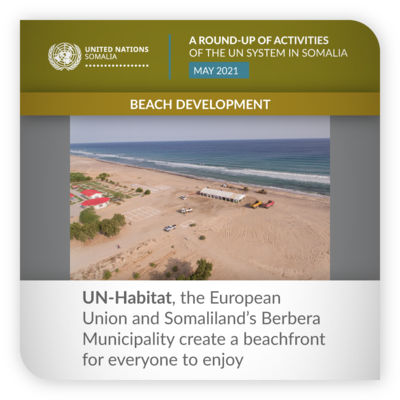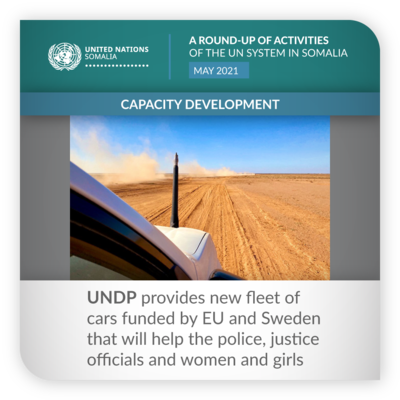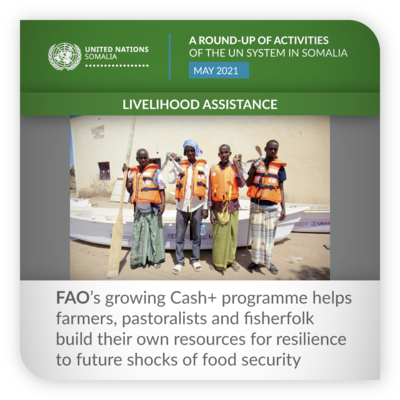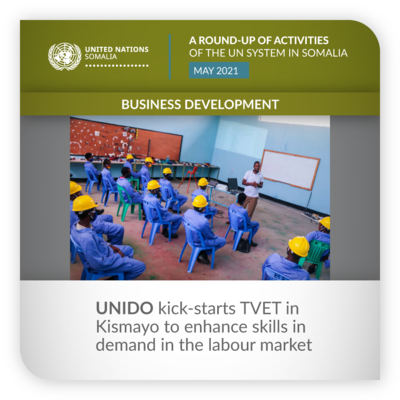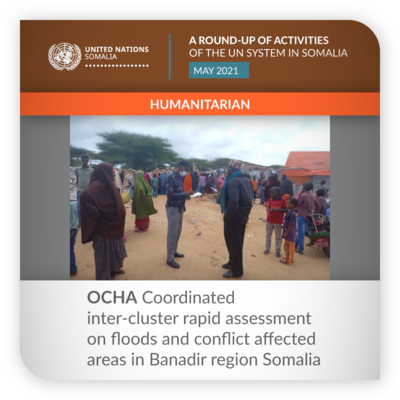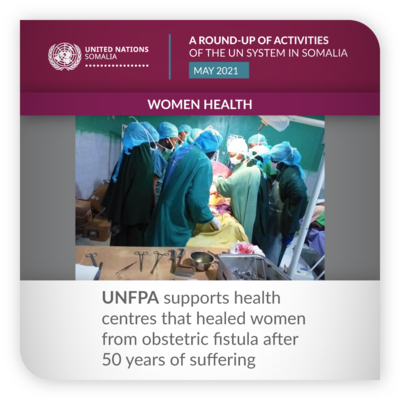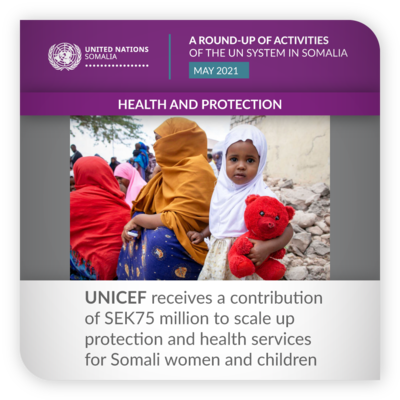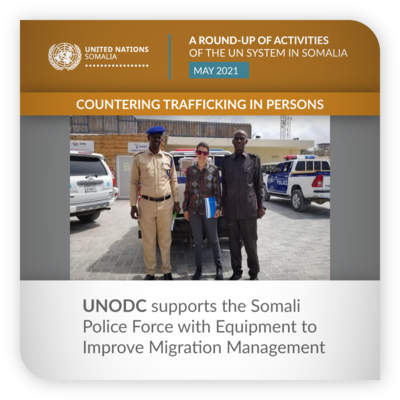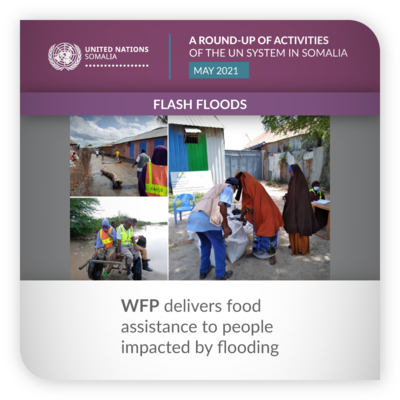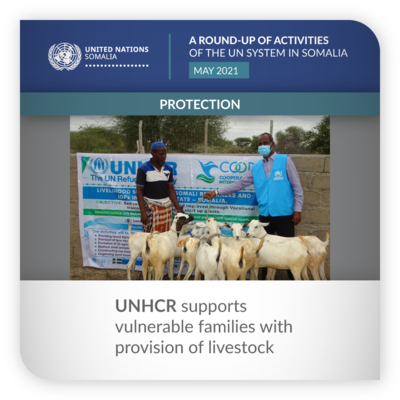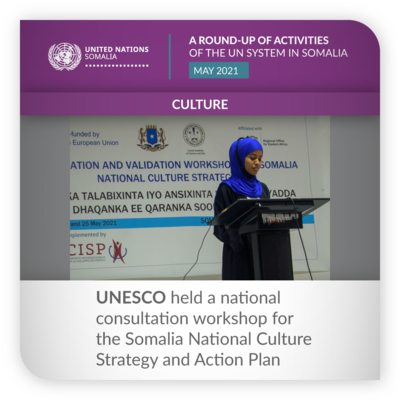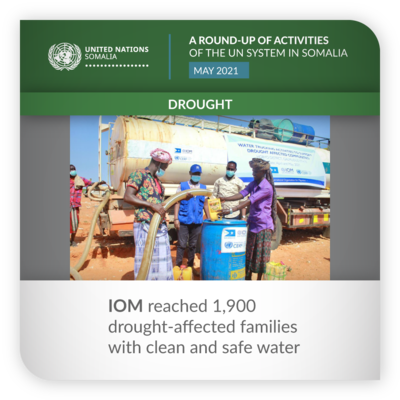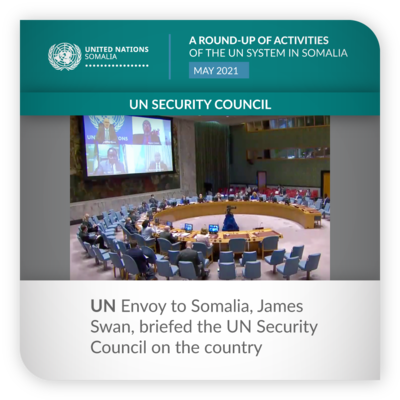A round-up of activities of the UN system in Somalia in May 2021
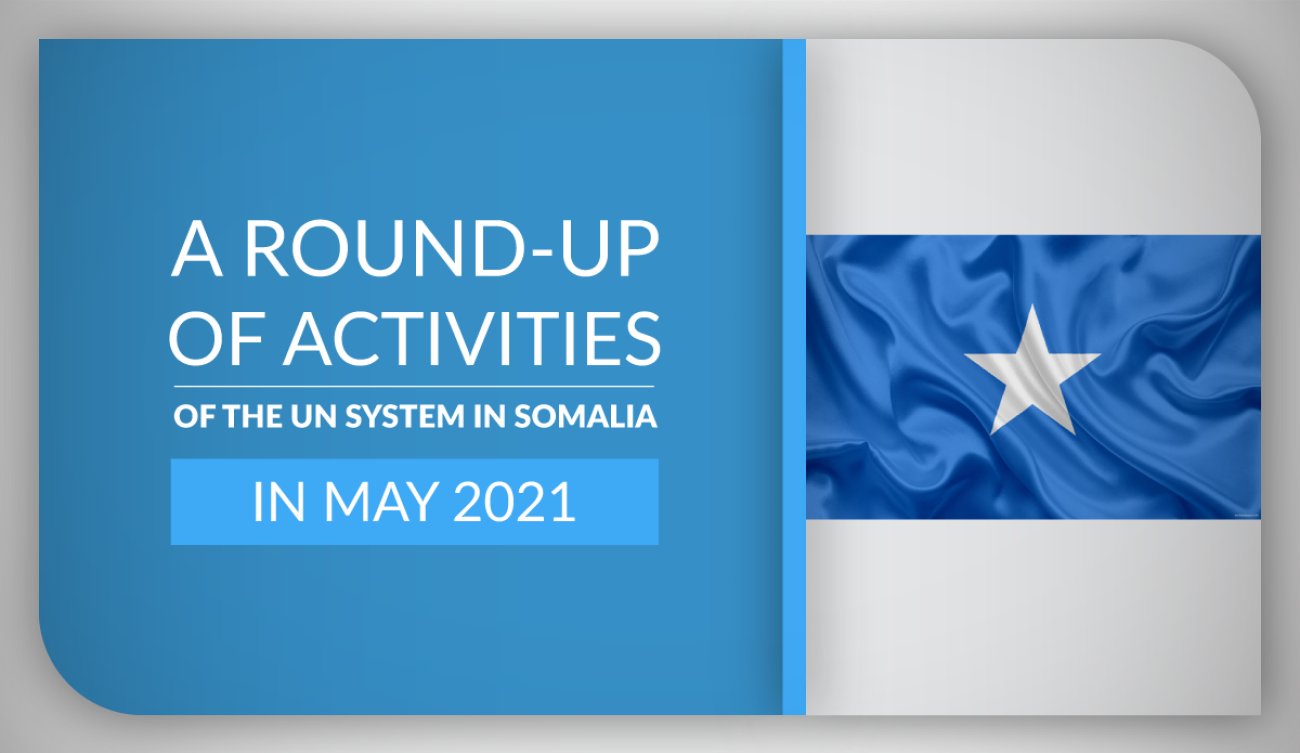
The UN family carried on supporting all Somalis in May.
|
|
Beach development | UN-Habitat, the European Union and Somaliland’s Berbera Municipality create a beachfront for everyone to enjoy UN-Habitat held a ground-breaking ceremony to launch the Berbera Beach Development which will provide recreational facilities for all and boost the local economy. The Berbera Beach project will result in a family area, a female-only area where girls and women can enjoy the beach and the sea freely, sports and youth facilities for girls and boys, a market area, a recycling facility and reserved public areas for rest, play, street vendors or cultural activities. The move is part of the EU-funded urban development project which is being implemented by the Berbera Municipality and UN-Habitat. |
|
|
|
Capacity development | UNDP provides new fleet of cars funded by EU and Sweden that will help the police, justice officials and women and girls The European Union, Sweden and the UN Joint Rule of Law team provided 13 new cars to government institutions in Somaliland, including the Police, Ministry of Interior, Judicial Commission and Attorney General’s Office. The cars will be used by officers at new police stations being constructed this year with support from UNDP and by justice officials monitoring regional courts and dedicated Women and Children Units where female prosecutors assist those reporting abuse. In the short-term, the cars will also be used by election security risk assessment teams to meet with police officers and local communities in six regions and to monitor local election preparations and voting. |
|
|
|
Livelihood assistance | FAO’s growing Cash+ programme helps farmers, pastoralists and fisherfolk build their own resources for resilience to future shocks of food security For decades people in Somalia have been vulnerable to the multiple shocks such as floods, droughts, locusts and conflict impacting their food security and livelihoods. FAO’s Cash+ programme has been streamlined from previous years and expanded, combining cash payments with nutrition education and equipping people with farming, livestock and fishing tools to increase food security and strengthen their livelihoods. http://www.fao.org/news/countries-good-practices/article/en/c/1399020/ |
|
|
|
Business Development | UNIDO Somalia funded by AICS through the Enterprise Development Unit (EDU), kick-starts TVET in Kismayo to enhance skills in demand in the labour market UNIDO Somalia in Kismayo in partnership with KTI, promoted EDU in the commencement of TVET trade in Plumping to upgrade the skills of 20 young and dynamic students. The participants will also receive hands-on practical training and placement with various relevant companies. Furthermore, within the framework of Agro-technology, EDU’s Baidoa, Mogadishu and Kismayo are in preparation of launching, TVET trades in Welding, Packaging/Storage of Fruits and Vegetables and Fish Handling, training over 160 students during the 1st batch. The aim is to increase the availability of skilled labour in the market and to further the careers of the students. |
|
|
|
Humanitarian | OCHA Coordinated inter-cluster rapid assessment on floods and conflict affected areas in Banadir region Somalia An Inter-Agency Rapid Assessment was conducted on 9 May 2021 by UNOCHA, ACF, EFASOM, SIF, NRC, SCI, WARDI, MEDAIR, AET, PAH. OCHA and ACF led the assessment and drafted the report. Through a survey system data was collected from the partners by a team of enumerators jointly trained by OCHA and ACF. The teams assessed areas of displacement and places of origin. It was noted that about 95% of the affected people had fled to safer parts of the city, including Hamar-Jajab, Hamarweyne, Kahda, Heliwa, Deynile, and Wadajir districts. The majority of IDPs in the visited camps are in bad living conditions, struggling to get the essential services and resources necessary to meet their needs. As a key recommendation - the affected population living in Banadir region are in dire need of immediate assistance. Key priorities include; food, shelter and NFIs, hygiene promotion activities and construction of latrines are recommended to avoid disease outbreaks. |
|
|
|
Women Health | UNFPA supports health centres that healed women from obstetric fistula after 50 years of suffering UNFPA supports the health sector in Somalia, including public and private entities and NGOs, to run three main fistula centres in Mogadishu, Puntland and Somaliland to end obstetric fistula in Somalia by 2030. “I had no idea that my situation was redeemable,” says Ashikiro Guure Cali who recovered from obstetric fistula, after 50 years of endless suffering. She lived with one of the most demeaning medical nightmares any woman could suffer. Ms. Cali, 70 years old, comes from Elbuur district, some 377 kilometres from Mogadishu, Somalia. Ms. Cali, a single mother, gave birth when she was 20-years-old and sustained the fistula injury after an obstructed labour that lasted for three days. She could no longer control the flow of urine from her body after the ordeal. |
|
|
|
Health and Protection | UNICEF receives a contribution of SEK75 million to scale up protection and health services for Somali women and children The Government of Sweden, through its partnership with UNICEF, has donated SEK75 million (USD9 million) to strengthen health and protection services for Somali women and children. The funding will also support the COVID-19 vaccination campaign which is currently underway and is one of the largest immunization drives the country has undertaken. |
|
|
|
Countering trafficking in persons | UNODC Supporting the Somali Police Force with Equipment to Improve Migration Management Thanks to funding by the European Union (EU) Emergency Trust Fund (EUTF) for Africa and the German Federal Ministry for Economic Cooperation and Development (BMZ), UNODC's regional office for Eastern Africa (ROEA) handed over equipment to two Anti-Trafficking-in-Persons-Units of the Criminal Investigation Department (CID) of Mogadishu on Saturday the 21/5, and to the CID of Garowe, Puntland, on Wednesday 26/5. The equipment included computers, a vehicle, smartphones, printers, and scanners, all procured within the Better Migration Management (BMM) programme. The overall objective is to improve migration management and, in particular, to address the trafficking and smuggling of migrants within and from the Horn of Africa. |
|
|
|
Flash floods | WFP delivers food assistance to people impacted by flooding WFP has been delivering life-saving food to people impacted by the devastating flash floods in Somalia. In Hirshabelle, since torrential rains and breakages along the banks of the Shabelle river left much of Jowhar city and outlying villages underwater, WFP has been distributing in-kind food to 21,000 people in the area. WFP continues to work with local authorities and the rest of the UN family to address the many urgent needs that remain – including providing logistics support to help humanitarian actors access flood-affected areas. |
|
|
|
Protection | UNHCR supports vulnerable families with provision of livestock In May, UNHCR and implementing partner Cooperazione Internazionale (COOPI) distributed 300 livestock to families living in Dobley. The distribution of high quality herds mainly targeted vulnerable female headed households from the returnee and host communities. Many of the beneficiaries are from a pastoral background with the necessary livestock rearing skills and this will help them boost their food production and gain an extra income. The distribution has also coincided with improved pastures and accessibility to water due to the ongoing rains. Livestock restocking is part of UNHCR’s livelihood projects that support displaced communities to be self-reliant. |
|
|
|
Culture | UNESCO held a national consultation workshop for the Somalia National Culture Strategy and Action Plan The hybrid workshop mobilized 55 cultural stakeholders to engage in a participatory process for the Culture Strategy review, including 35 Somali participants at SOMASA in Mogadishu and 20 Somali and international participants who joined online. Eighteen youth were among the participants, half of them female. The workshop was led in English and Somali with simultaneous interpretation available in both languages. The National Culture Strategy and Action Plan were developed for Somalia following a national consultation and experts meeting in November 2020, which looked at natural and cultural heritage, intangible cultural heritage, underwater cultural heritage, and the cultural and creative industries sector in Somalia, as well as their role in promoting peace and sustainable development. https://en.unesco.org/news/somali-youth-guide-development-national-culture-strategy-somalia |
|
|
|
Drought | IOM reached 1,900 drought-affected families with clean and safe water IOM scaled up its efforts to enhance access to temporary safe and clean water to displaced populations and communities affected by the recently declared drought. IOM visited communities in Galmudug State and reached approximately 11,400 individuals with a total of 3,307,500 liters of water through water trucking. IOM continues to work closely with local community leaders and relevant authorities to respond to the needs of the most vulnerable. https://twitter.com/IOM_Somalia/status/1395024019578097668?s=20 |
|
|
|
UN Security Council | UN Envoy to Somalia, James Swan, briefed the UN Security Council on the country The UN Envoy to Somalia, James Swan, briefed the UN Security Council on the country, covering several topics, including challenges and progress in Somalia’s political, security and humanitarian spheres. SRSG Swan commended the Somali leaders on progress made and urged them “to demonstrate the leadership the country requires of them at this critical juncture”. While voicing concern on the security situation, SRSG Swan spoke of progress being made in implementing the revised Somalia Transition Plan. On the humanitarian front, SRSG Swan noted the critical needs prompted by climatic shocks, increased displacement and food insecurity. He appealed for further humanitarian assistance. |

